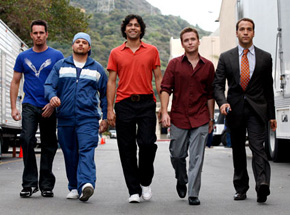|
|
Mythology: Gender MythologyBy Martin FelipeSeptember 1, 2010
Also a show that got some good notice at first, Entourage has encountered its own backlash in recent seasons. I would argue that the show is even shallower and more insulting to its target audience than Sex and the City. The four central characters are far more poorly defined, not even settling into any discernable male archetypes. Eric is the straight man, Drama is the buffoon, and I have no idea how to define Vince or Turtle, other than boring. For that matter, the acting is far more uneven, with only Kevin Dillon and Jeremy Piven providing performances of any enduring value. The Sex and the City ladies have some emotional depth to them, but all the Entourage boys do is posture, trash talk and swagger. I understand the voyeuristic value of watching peacockery and status seeking, but if this is how Hollywood sees ideal maleness, then I’m insulted for my entire gender. One summer show that does explore both the strengths and weaknesses of male identity is Rescue Me, yet another show backlashing like crazy. I do think it’s getting a little long in the tooth - no argument there - but I think there is some value in its more complex portrayal of manhood. Unlike the two HBO shows, Rescue Me’s characters are layered, complex, and fascinating to watch. The dialogue is as witty and snappy as Sex in the City’s, and the acting is flawless. I won’t go into the cast individually, but I will say that I could watch Dennis Leary stammer, hem and haw for hours. The setting is blue collar, unlike Entourage, while the story is down and dirty. The most admirable aspect of the show, in my opinion, is its portrayal of male identity. Oh, these characters swagger just as much as our Entourage boys do, but Leary doesn’t glamorize it, or present it as an ideal. Rescue Me celebrates the heroism of masculinity, while poking holes in its pretensions. And when it does poke those holes, it does it with layers and depth, not reducing characters to simple buffoons like Drama. I would be remiss if I were to neglect one of Rescue Me’s biggest critiques - that its portrayal of women is negative and borderline misogynist. All of the women are shrill, naggy or hot sexual conquests for Tommy and Franco. I don’t know if I agree with this assessment or not, I’m just putting it out there. One summer show that has (thus far) eluded backlash is recent Emmy threepeat Mad Men. The benefit of time allows us to look upon the sexism of the '60s and chuckle at their breezy sexual harassment with the benefit of 40+ years of societal evolution. Weren’t those men silly back then? Weren’t the ladies silly in their own way for accepting it? The thing about Mad Men is that it condescends to a culture of the not too distant past, perhaps asking us to consider the folly in our current gender identities. Are we an advanced culture as compared to the '60s, or are we as foolish in our own way? Who knows? Like I said, don’t want too get heady here. Just want to take a look at how TV presents and challenges gender roles during the summer months. And if HBO is any indication, both men and women are a bunch of surface level narcissists. Other shows ask us to question our gender ideals, to embrace their strengths, and reject their weaknesses. Maybe that is a little heady after all. At least for the summer.
|

|
|
|

|
Friday, November 1, 2024
© 2024 Box Office Prophets, a division of One Of Us, Inc.


